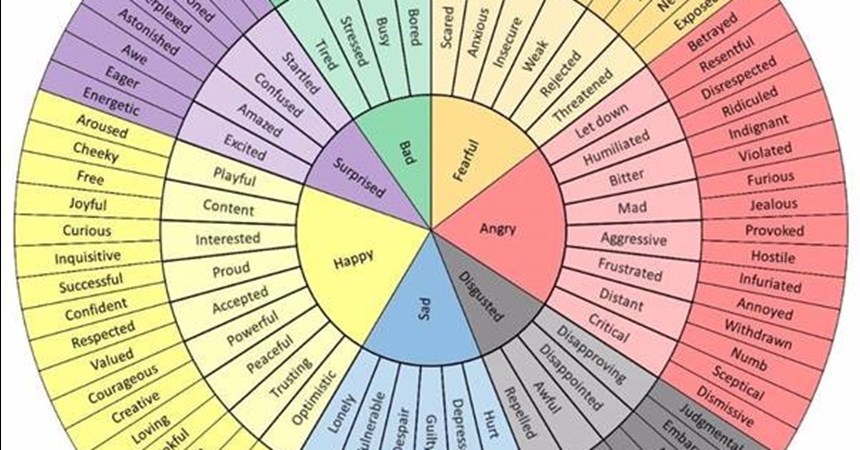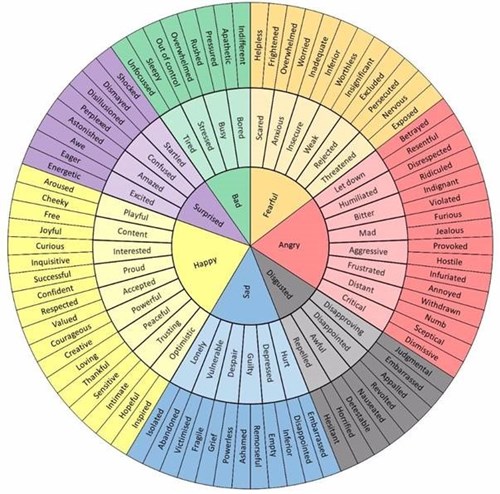By Christy Wilkie, LICSW, Therapist
Dakota Family Services
All children have occasional temper tantrums and outbursts. Because they don’t have the internal infrastructure to deal with big emotions, they get frustrated and angry. Other emotions—sadness, irritability, shame, guilt or embarrassment—usually lie at the root of a child’s anger. Anger is the fallback emotion when a child doesn’t have the vocabulary or awareness to explain other more complicated emotions.
The Emotional Wheel, developed by American psychologist Dr. Robert Plutchik, is a useful tool for helping kids identify their feelings. I often refer children to this adaptation of the Emotional Wheel during therapy which comes from classtools.net. It helps them (and me) identify the emotions beneath their anger so we can address the real issues.
In addition to referring to the Emotional Wheel (start in the middle and work your way out to identify the underlying emotions), consider the following suggestions for helping your child manage his or her anger.
- Stay calm. As hard as it is to keep our own emotions in check when our children are angry, mirroring their anger with our own exacerbates an already difficult situation. Remaining calm when your child is upset sends the message that their emotions are not “wrong.”
- Acknowledge and validate your child’s emotions. Our instinctual response is often to stop any emotion that causes distress. We say things to kids like, “Don’t be angry” and “Act your age.” This sends the message that emotions are not OK. When kids buy into this belief they try to control their emotions and worry they are letting you down. Listening, validating, and helping them regulate their emotions and behaviors sends a much healthier message of support and understanding. Give children permission to express their emotions as they arise to build their emotional intelligence.
- Don’t try to reason with your angry child. Rationalizing with an angry person, let alone an angry child, is not likely to be very successful. When we are in an emotional state, our rational brains have a difficult time kicking in. Trying to get kids to understand their actions are irrational is likely to make the situation worse. Instead of pointing out why your child “shouldn’t” be upset, offer coping strategies or distractions, calmly and one at a time.
For instance, say, “I see you’re upset. Would you like to ___________?” Keep your suggestions simple and straightforward. Offering more than one option may overwhelm your child.
- If you can’t calm your child, be present. Sometimes you won’t be able to calm your child, and all you can do is support and validate them through their anger. If you need a break, it’s OK to step away if you let your child know where you’re going. Say something like, “I can see that you’re still really angry, and I want to give you some space. I’ll be on the couch until you’re ready to talk to me.” This validates their emotions and sends the message that you are there for them but respect their need for space. When you are ready to re-engage, go back and sit with them through their big emotions.
- Follow up. When everyone is in a better emotional space, sit down with your child to discuss ways to handle these situations moving forward. What worked? What could you have done differently? Ask your child what they need from you when they are angry. If you lost your temper, which is only too human in these situations, acknowledge what you could have done differently and apologize. Say, “I know I lost my temper, too, and I’m sorry about that.” Apologizing is a powerful message that teaches accountability.
If your child's anger is out of control, ask for help from the school counselor or a local counseling agency like Dakota Family Services.
Dakota Family Services is a group of compassionate, practiced experts providing outpatient care—in a collaborative, multi-disciplinary setting—for children and adolescents with complex behavioral health issues. For more information, call 1-800-201-6495.
To join Christy and an amazing team of professionals, where you can work with and learn from the best, check out the Dakota Family Services career opportunities at http://bit.ly/DakotaRanchCareers.


